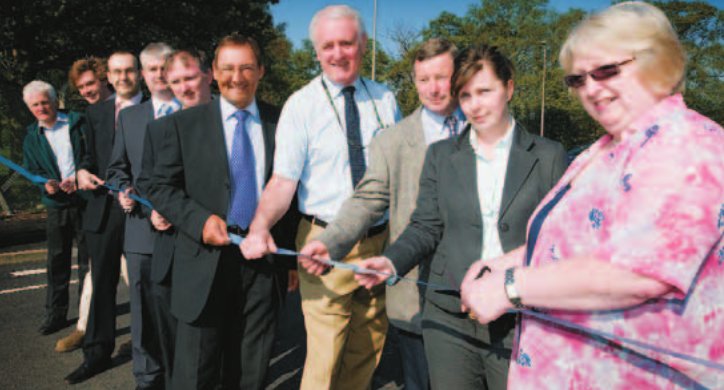 Close co-operation: Local councillors and AWE staff open a new roundabout at AWE Aldermaston in 2008.
Close co-operation: Local councillors and AWE staff open a new roundabout at AWE Aldermaston in 2008.
I think the most disappointing thing about West Berkshire Council's decision to grant planning permission for Project Pegasus – the new enriched uranium facility at AWE Aldermaston – wasn't the manner in which the planning committee casually ignored over 1400 letters of objection to the planning application. It wasn't the craven attitude of the councillors towards AWE. Nor was it the astonishing level of support shown by Liberal Democrat councillors towards the replacement of Trident nuclear weapons, in contrast to their party's policy. It was the notable failure of the councillors on the committee to say anything about AWE's pitiful failure to consult the public on a major planning application with significant implications for the area.
AWE's 'consultation' over the planning application for the enriched uranium facility amounted to informing its Local Liaison Committee about the application. The Local Liaison Committee (LLC) is a cosy collection of councillors who visit AWE every three months to have a friendly chat with AWE managers about how well everything is going at the site, followed by lunch together. The committee's meetings take place in private, with members of the public, the press, and non-government organisations refused access. The LLC was told by AWE about the planning application for Project Pegasus at a meeting on 10th December 2009, but the committee's eagle-eyed members apparently didn't spot that the planning application – submitted to West Berkshire on 27th November – had already been with the council for a fortnight, and so any comments they might wish to make were totally irrelevant. It's hard to see AWE's statement that “Public consultation has been a key aspect in the preparation of this planning application and is an important element of the planning process” as anything other than deliberately misleading.
Rather than stating that West Berkshire Council takes consultation on planning applications seriously, and telling AWE that they must do better in giving the public a say on development at their sites, members of the planning committee just made excuses for the company's poor performance. Councillor Royce Langton made a big fuss about AWE's Site Development Context Plan (SDCP), a blueprint for development at AWE. The SDCP was actually published five years ago, does not mention anything about construction of an enriched uranium facility, and was prepared for the limited purpose of providing information only – there is nothing in the document to say how members of the public can give feedback on its proposals – so it's hard to see how it can be part of any consultation process about the Pegasus planning application. (The SDCP is hidden away in a particularly hard-to-find part of the AWE website, but you can find it here, with a more recent update here).
Councillor Irene Neill's contribution to the debate was even less inspiring. According to Councillor Neill, all the local parish councils are represented on the LLC, and the representatives can report back to their parish council. As the minutes of parish council meetings are placed on public noticeboards where everyone can see them, no-one can complain that they haven't been kept informed about what is happening at AWE. This method of communication would have been inefficient and ineffective at the end of the nineteenth century, let alone at the beginning of the twenty first century.
Even government policy on planning – not noted for being radical or adventurous – emphasises the importance of consulting with local people. According to Planning Policy Statement 1, “Community involvement in planning should not be a reactive, tick-box process. It should enable the local community to say what sort of place they want to live in at a stage when this can make a difference".
AWE's company website makes the bold claim that “AWE recognises that it has a corporate social responsibility to contribute to a sustainable future, particularly for our employees and local communities”. AWE still has a long way to go to live up to this responsibility, and West Berkshire Council has even further to go in holding the company to account.
